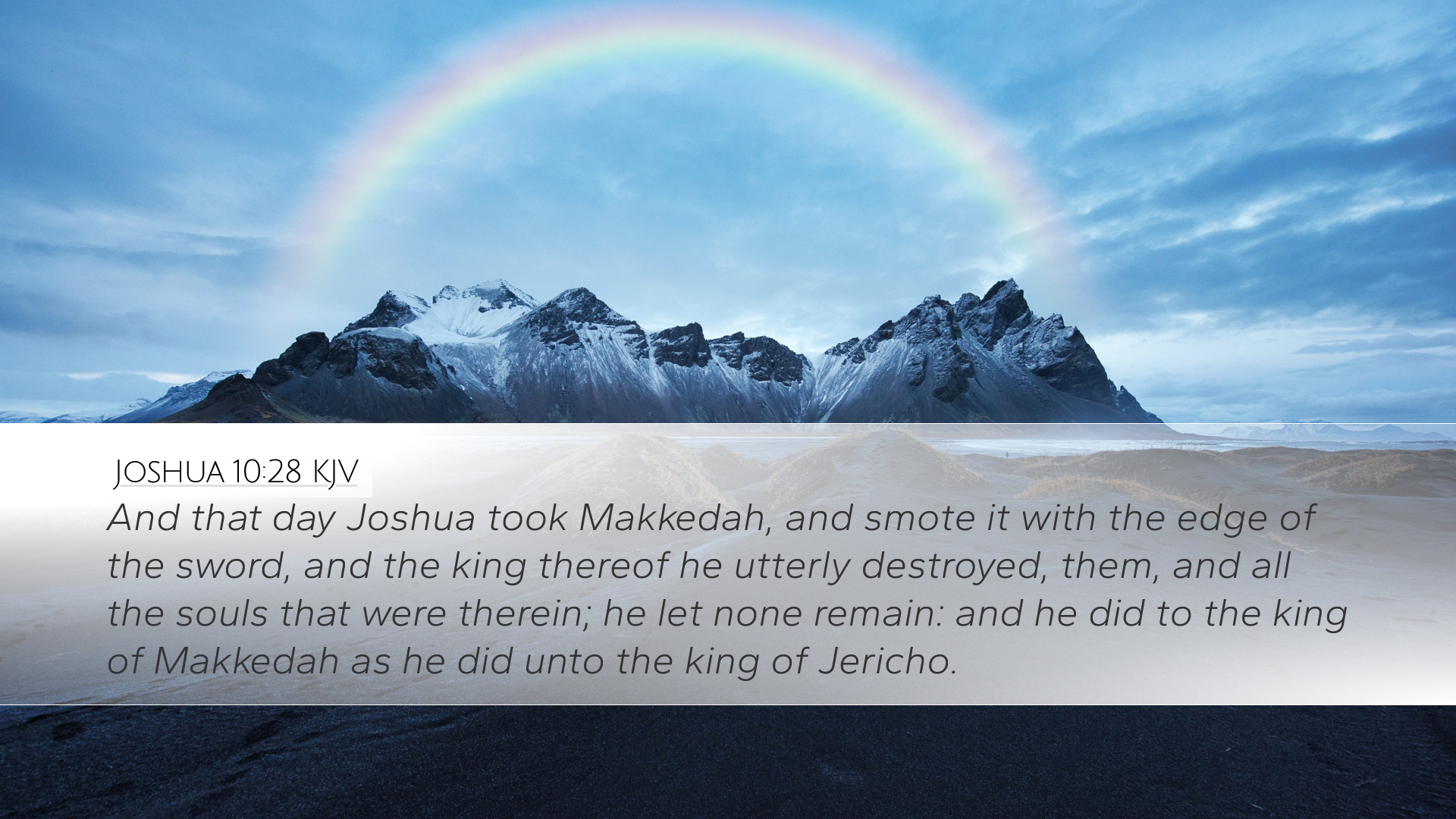Commentary on Joshua 10:28
Contextual Overview
The book of Joshua records the conquests of Israel in the Promised Land, focusing on God's faithfulness to His people. In chapter 10, we see a watershed moment where divine intervention and military victory intertwine. Joshua 10:28 serves as a poignant conclusion to one such victory.
Text of Joshua 10:28
"And that day Joshua took Makkedah, and smote it with the edge of the sword, and the king thereof he utterly destroyed, them, and all the souls that were therein; he let none remain: and he did to the king of Makkedah as he did unto the king of Jericho."
Historical Significance
This verse signifies not only a military achievement but also the theological principles underlying Israel's conquests. The total destruction of Makkedah, a city allied with other Canaanite kings against Israel, was both a fulfillment of God's command to drive out the inhabitants of the land (Deuteronomy 7:2) and a demonstration of His power.
The Divine Command
- Matthew Henry emphasizes that the destruction of cities and their populations was a direct fulfillment of divine command. He argues that the judgement executed through Joshua reflects God’s sovereign rule over the world and His use of Israel as an instrument of divine judgement against sin.
- Albert Barnes further expounds on the justice of God in these acts, indicating that these cities, having filled up the measure of their iniquity, were set for destruction. It was not merely a conquest but also a divine retribution for their idolatrous practices.
Execution of Justice
In this passage, we observe remarkable parallels between the conquests. Joshua executing justice reflects the serious nature of disobedience to God. Such a theme has been consistently pointed out in biblical theology. Adam Clarke comments, “It was a just retribution; for they had filled the measure of their iniquity, and God in His providence was executing judgment.”
Theological Implications
This verse reveals key theological themes relevant for pastors and scholars:
- The Sovereignty of God: Both Henry and Clarke point out that God's sovereignty is a prevalent theme throughout Israel’s history. His commandments regarding the conquest of nations were based on His ultimate authority and justice, revealing His plan for redemption and judgement.
- Holiness and Justice: The eradication of Makkedah symbolizes the seriousness of sin. God’s holiness necessitates judgment upon sin, and this act fulfills His criteria for justice and divine justice being enacted through human agents.
- Covenantal Faithfulness: Joshua's victories, including this one, affirm God’s covenant with Israel. God had promised the land to Abraham’s descendants, and through these conquests, He proves faithful to His promises.
Lessons for Today
The historical context and theological perspectives provide rich insights for contemporary faith practice:
- Understanding Divine Justice: Pastors can reflect on how the acts of God in the Old Testament inform our understanding of justice. The harsh reality of judgement serves to remind believers about the seriousness of disobedience to God.
- Faith in Action: Joshua’s obedience exemplifies active faith. The responsibilities of believers in modern times continue to involve exercising faith through action, stepping into God’s promises with conviction.
- The Importance of God’s Commands: The call for obedience resonates today. Joshua’s actions highlight the importance of following God’s directives within the scope of His will, even when it may not align with human logic.
Final Thoughts
Joshua 10:28 serves as a reminder of God's unwavering faithfulness, His divine justice, and the seriousness of obeying His commands. Each aspect of this conquest reflects the broader narrative of redemption that culminates in Jesus Christ, where judgment meets mercy and God's character is fully revealed.


